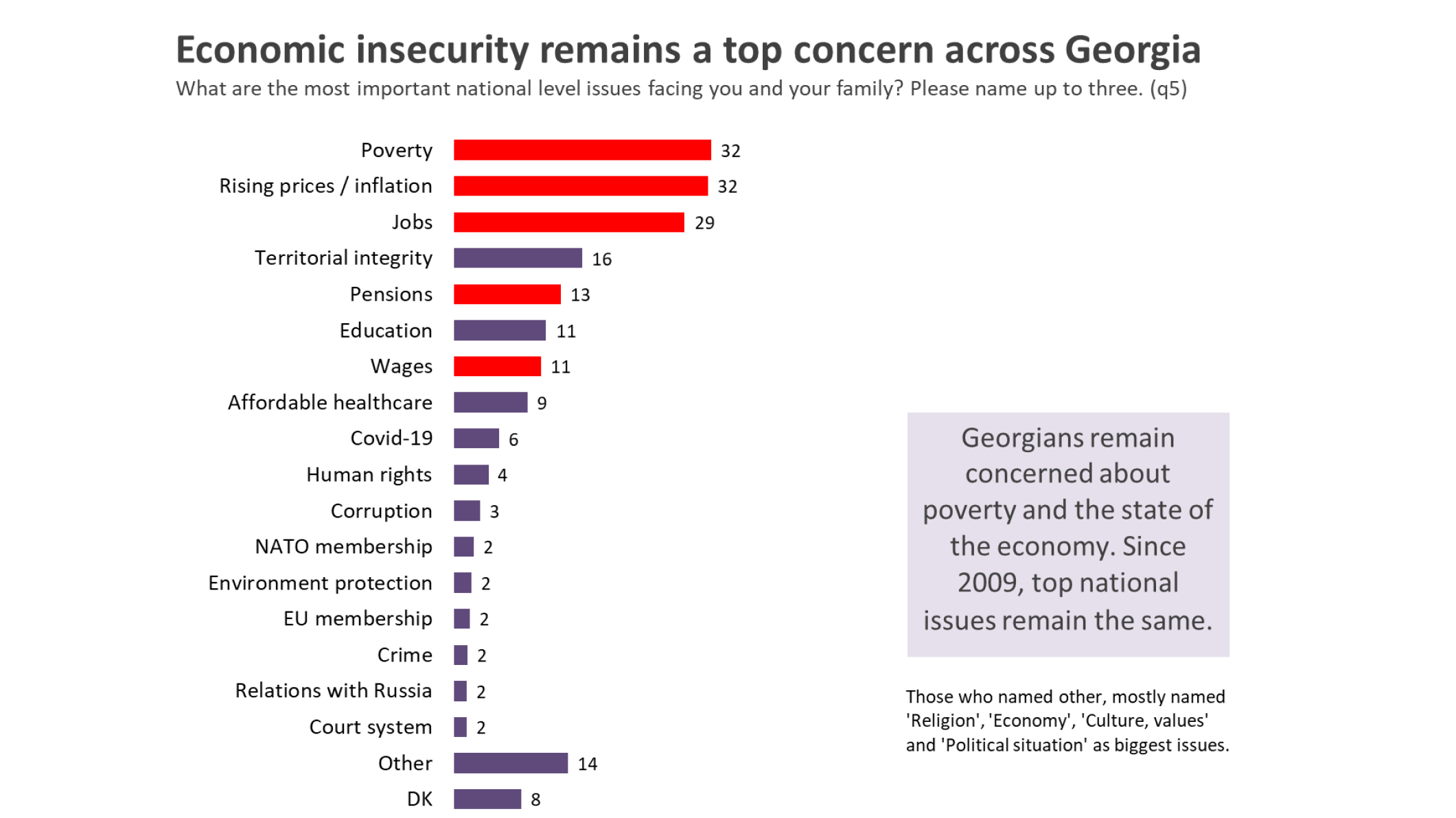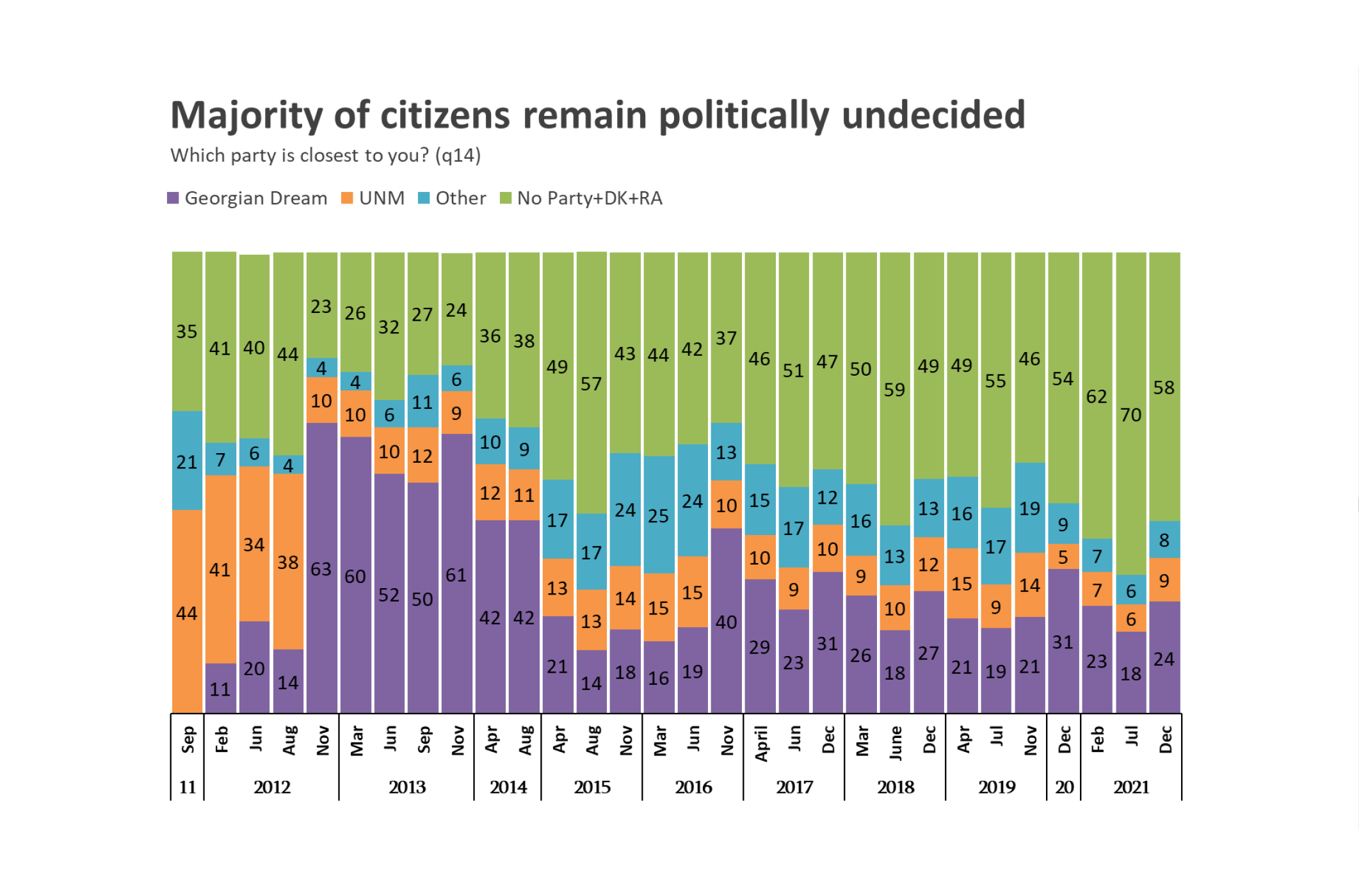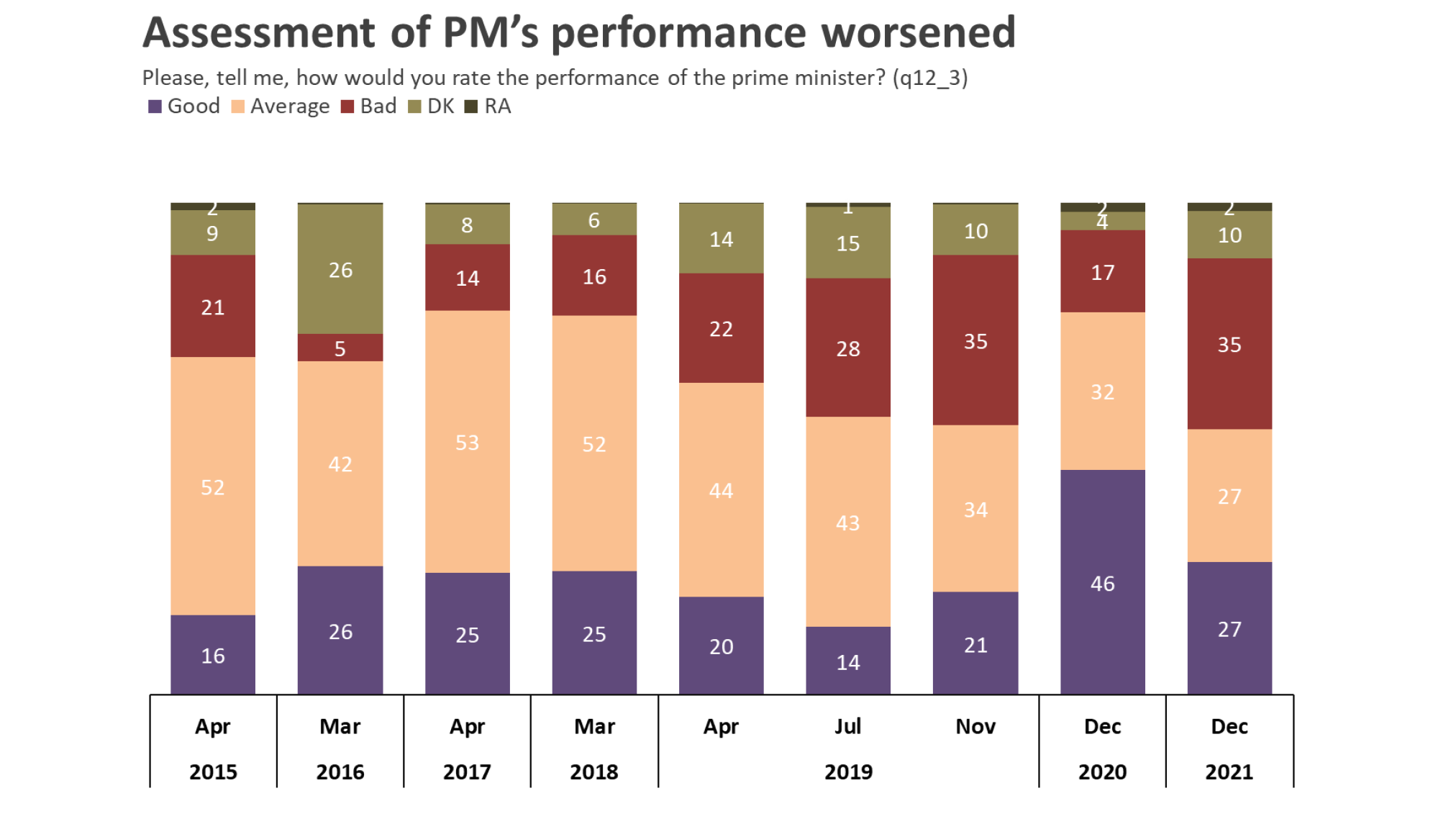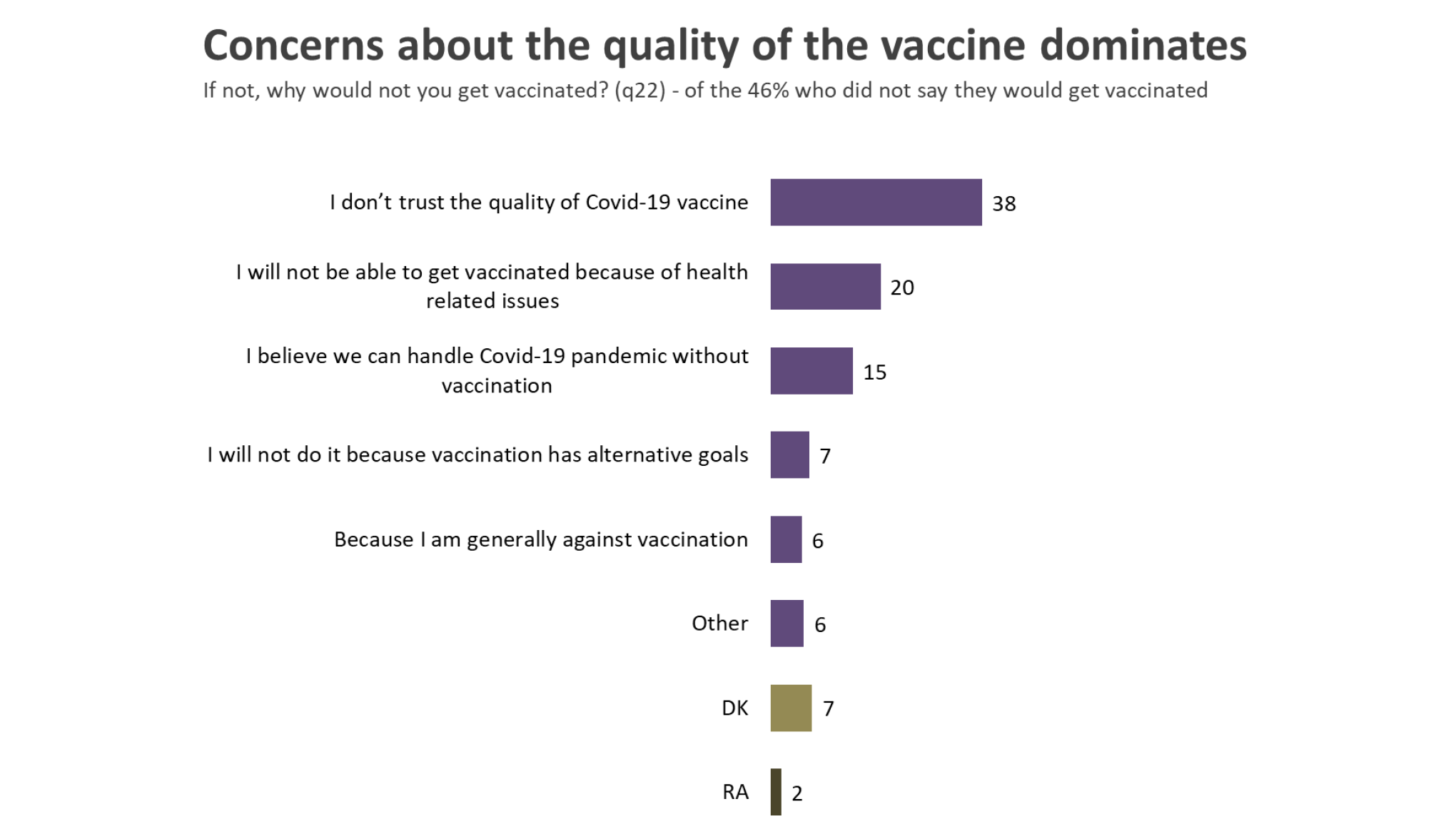
NDI Poll: Economy Top Concern, Lack of Confidence in Political Parties
The new public opinion survey commissioned by the National Democratic Institute (NDI), a U.S. non-profit, finds that Georgian people remain largely concerned over the economy and lacks confidence in political parties and institutions. In the meantime, vaccine hesitancy remains high among the public.
The survey, published on January 27, was fielded by the Caucasus Resource Research Centers (CRRC) for NDI between December 7 and 13, 2021 with the financial assistance of the UK’s good governance fund, and was carried out through nationwide mobile phone interviews (excluding occupied territories) with 2,099 respondents and has an average margin of error plus, minus 1.4%.
National Issues: Economy Remains Top Concern
According to the new survey, a plurality of respondents, 43%, believe Georgia is going in the wrong direction, down from 49% in the July survey.
Meanwhile, 21% of the respondents think the country is not changing at all and 27% believe it is going in the right direction, both numbers up from the previous survey.
Respondents, allowed to name three concerns, say poverty (32%), inflation (32%), jobs (29%), territorial integrity (16%) and pensions (13%) are the top national-level issues facing them and their families.
Meanwhile, NATO membership, environment protection, EU membership, crime, relations with Russia and court system are named by 2% of the interviewees.

As for key issues facing the Georgian economy, the interviewees name employment (49%), inflation (42%), poverty (23%), low wages (21%) and national currency devaluation (14%) as top problems.
NDI report says the public concerns are consistent across political affiliations, among Georgian Dream and opposition supporters as well as those who did not name a party they support.
According to the survey, the majority of respondents believe the situation regarding education, territorial integrity, crime and proverty has gotten worse over the past 10 years. Results show that the perception of poverty getting worse is visible even among the GD supporters (51%).
Lacking Confidence in Political Parties, Institutions
The poll finds that majority of the interviewees do not think that either ruling GD or the opposition parties are acting in their best interest. 51% say they do not agree that GD acts in their interest, 36% agree, while 13% do not know or do not answer.
Meanwhile, 53% of the respondents do not agree that the opposition parties elected to the Parliament or the Local Councils act in their best interest, while 31% agree and 16% either do not know or do not respond.
According to the survey, majority of citizens are politically undecided. Asked what party is closest to them, 41% say none, 12% refuse to answer and 6% do not know. Meanwhile, 24% name GD, 9% – UNM and 8% – others. While 58% are undecided, the number is down from 62% in February and 70% in July.
The poll finds that 66% of younger demographic (18-34) is undecided, a rate that stands at 50% in the 55+ age group.

However, the survey finds that 80% of Georgians are overwhelmingly in support of cross-party collaboration, consistently across political affiliations, age groups and urban and rural populations.
The majority of respondents (52%) are not satisfied with the current GD government, while 39% are and 9% do not know or answer. Meanwhile, plurality of respondents are not satisfied with the Parliament (46%), President Salome Zurabishvili (46%), Central Election Commission (35%) and Prime Minister Garibashvili (35%).
The poll finds that the assessment of PM Garibashvili’s performance is worse than that of predecessor Giorgi Gakharia in December 2020. For example, 27% rated PM Garibashvili’s performance as good, as opposed to 46% saying the same about Gakharia in 2020.

Meanwhile, negative assessment of President Zurabishvili’s performance shot up from 36% to 46% over the span of December 2020-2021, while negative assessment of CEC’s performance tripled in the last six years.
Georgians also remain skeptical of the Parliament’s willingness to address their concerns, with 53% disagreeing that the legislature passes legislation on issues that matter to them, 52% believing MPs will not help solve issues in their communities and 61% disagreeing that the legislature regularly communicates with the public.
While 92% of the respondents believe that democracy is either very important or important, 50% of citizens say Georgia is not a democracy now as opposed to 39% saying it is and 11% not knowing. 70% of GD supporters say Georgia is a democracy and 74% of opposition supporters argue it is not, while 55% of those who named no party concur with the latter opinion.
Anti-Vaccine Attitudes Remain High
According to the survey, 42% of respondents say they will not get vaccinated and 3% say they don’t know if they will. In the meantime, 29% say they already received the jab and 25% will get vaccinated. However, the poll shows the amount of those against vaccination decreased from 47% to 42% from July to December 2021.
As for boosters, 63% of respondents agree to receive an additional jab, 3% say they already took the dose, while 14% will not and 20% do not know if they will.
Key concerns of the anti-vaxxers are the quality of the jabs (38%) and existing health-related issues (20%), while 15% believe they can handle the pandemic without vaccination.

Also, 59% of the interviewees are against vaccinating kids, 15% do not know if they will vaccinate their child, while 26% say they will and 1% say they have done so already.
The number of people who believe praise the Government’s handling of the COVID pandemic has decreased from 68% in February 2021 to 50% in December. On the other hand, 23% of the interviewees fully and 50% somewhat trust Georgia’s healthcare system.
See the findings here.
Also Read:
- Georgians Overwhelmingly Support Joining EU, NATO, New Survey Shows
- Economy Top Issue, Vaccine Hesitancy High, NDI Poll Shows
This post is also available in: ქართული Русский